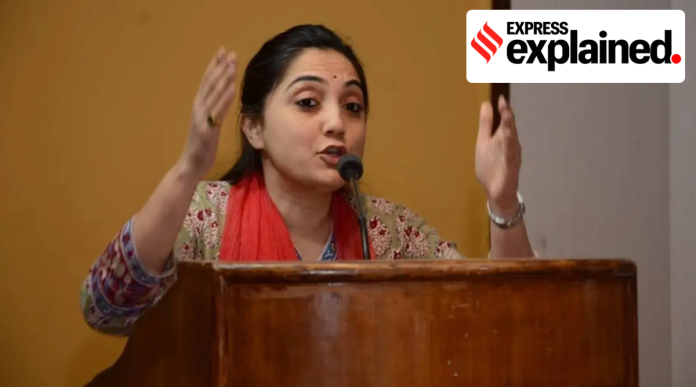ON FRIDAY, the Supreme Court declined a plea by former BJP spokesperson Nupur Sharma to club the hate speech cases filed against her across the country. A vacation bench of Justices Surya Kant and JB Pardiwala, while refusing to grant interim relief, criticized the remarks she had made leading to the case against her.
What was Sharma’s plea?
In the last week of May, when she was still BJP spokesperson, Sharma had made derogatory remarks about the Prophet and the Muslim community on several television debates. Following her suspension from the BJP, Sharma issued an apology and withdrew her statements. Several FIRs were registered against her including in Delhi, Mumbai, West Bengal and Assam. Sharma moved the Supreme Court seeking a transfer of all cases of hate speech against her to a court in Delhi.
What did the Supreme Court say?
The court refused to grant interim relief to Sharma and instead asked her to approach the High Courts. The bench also made several observations against her remarks, underlining that her comments were “irresponsible”.
“The way she has ignited emotions across the country… this lady is single handedly responsible for what is happening in the country,” Justice Surya Kant said.
On what grounds are such cases clubbed?
A person cannot be prosecuted more than once for the same offense. Article 20(2) of the Constitution guarantees the right against double jeopardy. Multiple FIRs on the same incident would mean virtually multiple trials. Approaching the Supreme Court in such situations is a procedural safeguard against excessive litigation.
In TT Anthony v State of Kerala, a 2001 verdict, the Supreme Court held that there cannot be a “second FIR” on the same issue.
“There can be no second FIR and consequently there can be no fresh investigation on receipt of every subsequent information in respect of the same cognizable offense or the same occurrence or incident giving rise to one or more cognizable offenses. On receipt of information about a cognizable offense or an incident giving rise to a cognizable offense or offenses and on entering the FIR in the station house diary, the officer in charge of a Police Station has to investigate not merely the cognizable offense reported in the FIR but also other connected offenses found to have been committed in the course of the same transaction or the same occurrence and file one or more reports as provided in Section 173 of the CrPC,” the court had said.
In 2020, the Supreme Court in the case of Arnab Goswami v Union of India expanded this ruling and said that similar FIRs in different jurisdictions also violated fundamental rights.
“Subjecting an individual to numerous proceedings arising in different jurisdictions on the basis of the same cause of action is a violation of fundamental rights,” a bench headed by Justice DY Chandrachud said.
The court said that in such a situation, the petitioner can approach the Supreme Court to club the proceedings. “A litany of our decisions – to refer to them individually would be a parade of the familiar – has firmly established that any reasonable restriction on fundamental rights must comport with the proportionality standard, of which one component is that the measure adopted must be the least restrictive measure to effectively achieve the legitimate state aim. Subjecting an individual to numerous proceedings arising in different jurisdictions on the basis of the same cause of action cannot be accepted as the least restrictive and effective method of achieving the legitimate state aim in prosecuting crime,” the court said.
Why did the Supreme Court deny Sharma’s plea?
The SC vacation bench distinguished Sharma’s case from the precedent in the Arnab Goswami case. It indicated that the court had granted relief to Goswami since he was a journalist and the same status cannot be extended to Sharma who was a party spokesperson.
Although the SC in Goswami’s case emphasized press freedom, it noted that the Constitution guarantees the same free speech rights to all citizens.
Newsletter | Click to get the day’s best explainers in your inbox
“But to allow a journalist to be subjected to multiple complaints and to the pursuit of remedies traversing multiple states and jurisdictions when faced with successive FIRs and complaints bearing the same foundation has a stifling effect on the exercise of that freedom. This will effectively destroy the freedom of the citizen to know of the affairs of governance in the nation and the right of the journalist to ensure an informed society. Our decisions hold that the right of a journalist under Article 19(1)(a) is no higher than the right of the citizen to speak and express. But we must, as a society, never forget that one cannot exist without the other,” the Court had said.
The Goswami and Anthony rulings are both valid precedents that were binding on the vacation Bench. However, in an oral observation, the vacation bench said that “if the conscience of the court is not satisfied, the law can be moulded”.

